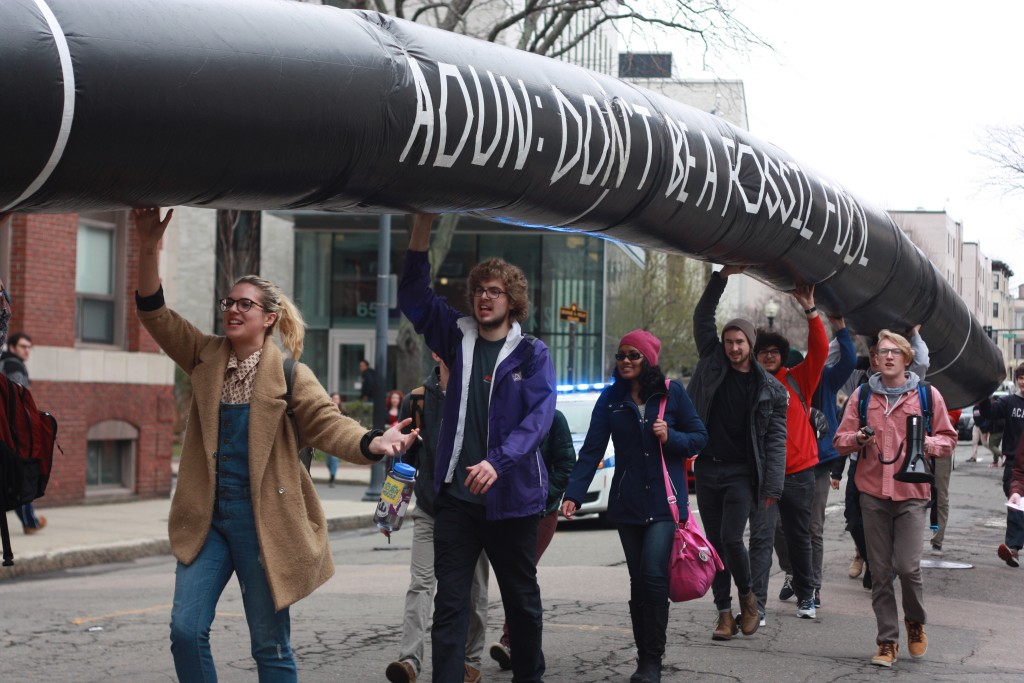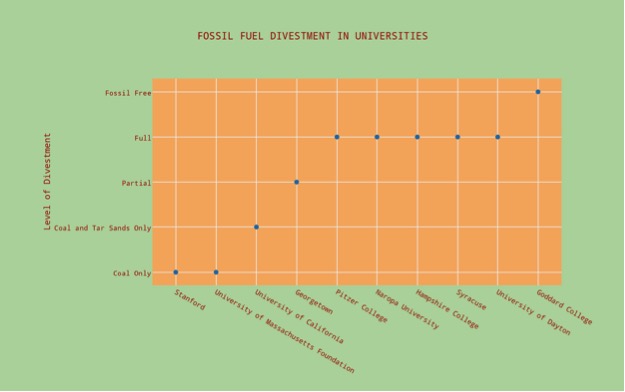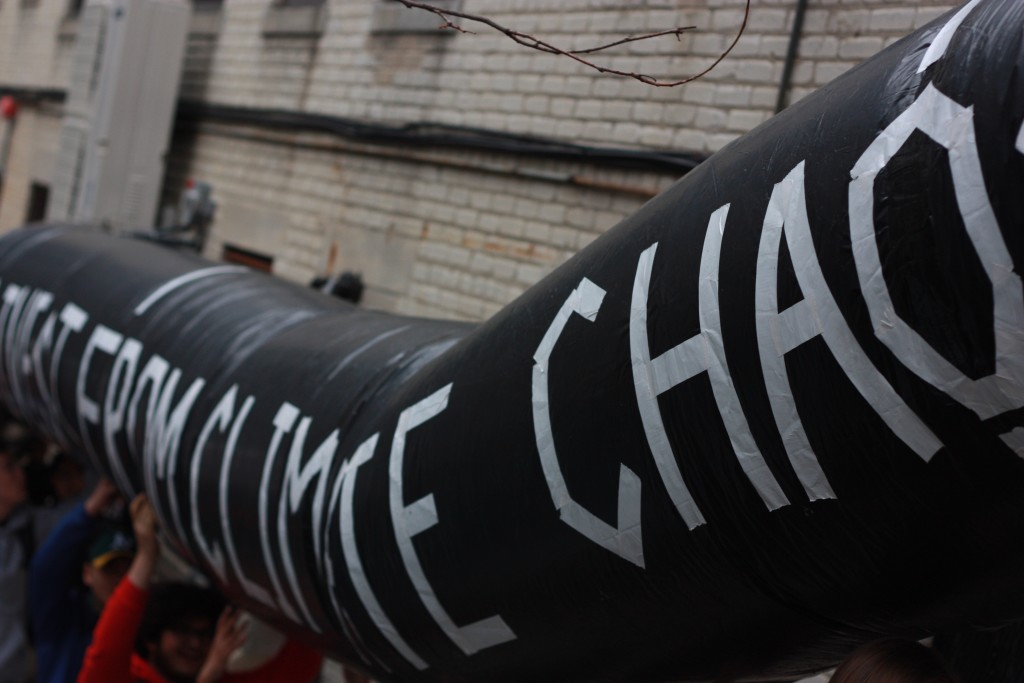The battle over fossil fuel divestment is coming to a head at Northeastern University.
Student activists have spent years wearing down the administration with referendums and protests, arguing that the University’s investments should mirror the green image it is promoting. But school officials say that limiting investments could damage the University’s endowment and could hinder efforts for cleaner energy.
In an April 7 decision, the University’s Social Impact Council, made up of faculty members, administrators and students, unanimously agreed to forward a recommendation for fossil fuel divestment to the administration’s Senior Leadership Team, which includes the school’s top officials. The Board of Trustees could be confronting the question as soon as this fall.
“A lot of us in the divestment campaign are motivated not just on an environmental sustainability level, a lot of us are more motivated on kind of a moral imperative, and that’s what the movement has tried to emphasize,” said Charlie Cavallaro, a third-year economics and environmental science major and member of DivestNU, a student activist organization.
But Michael Armini, senior vice president for external affairs, raises questions about how divestment — getting rid of stocks, bonds and other investments that can be considered unethical — would affect the university.
“I think that when you decide that there is a certain class of investments that you are not going to be involved in, you limit the ability of the endowment managers to grow the endowment,” Armini said.
Northeastern is just one of many schools in this country that is grappling with this controversy. Some schools, such as Dayton University in Ohio, are divesting fully; others like Harvard have rejected the idea.
The decision over divestment at Northeastern has been a long and bureaucratic process. In 2014, DivestNU sponsored a referendum where 75 percent of the more than 3,600 students who voted said the school should divest from fossil fuels. In response, President Joseph Aoun acknowledged the vote and established the Social Impact Council to look at the divestment issue and other social issues that students voiced.

Even with this month’s decision, no changes will be implemented without action from school officials.
The Senior Leadership Team must now decide whether to approve the divestment topic for consideration by the Board of Trustees. DivestNU said it hopes a final decision will be made by the time the board meets again, in March 2017. The activist group has hosted numerous sit-ins and protests over the years, including a protest in March where they carried a 50 foot inflatable gas pipeline through campus that read “Aoun: Don’t Be A Fossil Fool” on one side and “Divest From Climate Chaos” on the other.
Not all students and graduates are keen on the idea of divestment. Some say they believe that the school’s fiduciary responsibility is towards investors and growing the endowment. There is concern that pulling funds out of fossil fuel companies will work against the school’s financial best interest.
“I think first of all it’s a bad idea to have students with no real background in investing dictating the endowment policy of a university the size of Northeastern,” said Patrick O’Neil, who graduated in 2015 with a degree in finance. “I want to make sure that the university I graduated from — and that I worked at for that degree — is viewed in a positive light and acts in a way that I would be proud of as an alumnus. And I think one of the most important things in that regard is ensuring that we continue a strong endowment in order to benefit current generations of students.”
Matthew Soleyn, a 2010 graduate of Northeastern who works as a project manager in information technology strategy and planning at Blue Cross Blue Shield, said he believes some criticism against the fossil fuel industry has been overblown.
“The fossil fuel industry does create many jobs and creates opportunities for people to start their career,” Soleyn said. “On the flip side, the energy sector outside of fossil fuels, [like] renewable energy, are also creating lots of jobs and lots of opportunities, as well. But there has to be, I think, a balance between the two for the time being.”
Although the school administration has so far stayed neutral, they have engaged in some dialogue with student activists. In an April 2013 letter to a co-executive director of DivestNU, Armini, the senior vice president for external affairs, wrote, “Rather than encouraging responsible action and supporting shareholder-led efforts, divestment by institutional investors may do more to impede the active clean energy transition now underway.”
Richard Reibstein, a lecturer of Environmental Law and Policy at Boston University, said there is no real evidence that large fossil fuel companies are making investments in clean energy. An example that he gave was of Tony Hayward, the CEO of BP during the Deepwater Horizon oil spill in 2010. According to Reibstein, Hayward stopped whatever investments BP was making in clean energy because he believed it was too much of a risk.
“His concept of risk is investing in things he thinks will bring in less money,” Reibstein said.
Reibstein has presented the idea of “climate responsible investment” to shift the conversation away from divestment, a word that he finds too negative. He said he believes that rather than focus on where we need to pull our money out of, we should look at ways to reallocate it.
“So the term climate responsible investment, I invented it in order to focus us on where our attention needs to be, which is really, divestment is the second step,” Reibstein said. “The first thing to do is figuring out where we should put the money.”
While some schools have made the decision not to divest at all, others have chosen to either divest fully or partially.

“I believe that much of it comes down to how the investment committee views itself,” said Nathaniel Bullard, global head of executive insights at Bloomberg New Energy Finance, of this range of divestment. “I believe that most hold dearly to their independence, and also to their own sense of being the expert investors who don’t need to be and don’t want to be told what to do by students and activists.”
Not all forms of divestment are created equal, however.
“I will say that divesting from coal stocks — which are not a large asset pool particularly after they have lost so much value in the past five years — is not a difficult decision because it does not require a huge reallocation,” Bullard said.
The Board of Trustees will make a final decision on whether or not to divest, but some students have called attention to one member’s background and how it might affect the vote. Vice Chairman of the Trustees Edward Galante, who graduated from Northeastern in 1973, worked at ExxonMobil for 34 years before retiring as senior vice president in 2006. ExxonMobil was his co-op employer. Galante is involved in many organizations, including serving as a director of Clean Harbors, Inc.
The New York Times and others have reported that ExxonMobil has been under fire recently over documents that suggest it may have known about climate change and worked to disprove its existence.
Efforts to reach Galante for comment were unsuccessful.

The controversy over divestment comes as Northeastern continues working towards sustainability and projecting an environmentally-friendly image. The university was a founding member of the American College & University Presidents Climate Commitment in 2007, working to end greenhouse gas emissions. It was ranked the greenest university in America by the University of Indonesia in 2014. In its daily functions, the university promotes recycling and composting.
“We should always be striving to do more, both as a campaign and more generally as a campus community,” Cavallaro, the third-year economics and environmental science major, said. “I think the strides Northeastern has made in the past 15 years in terms of sustainability initiatives has been really positive and really great, but we don’t think that should be an excuse to then take the foot off the pedal.”
For more on this topic, stay tuned for an exclusive article on greenwashing at Northeastern in our Summer 2016 issue.